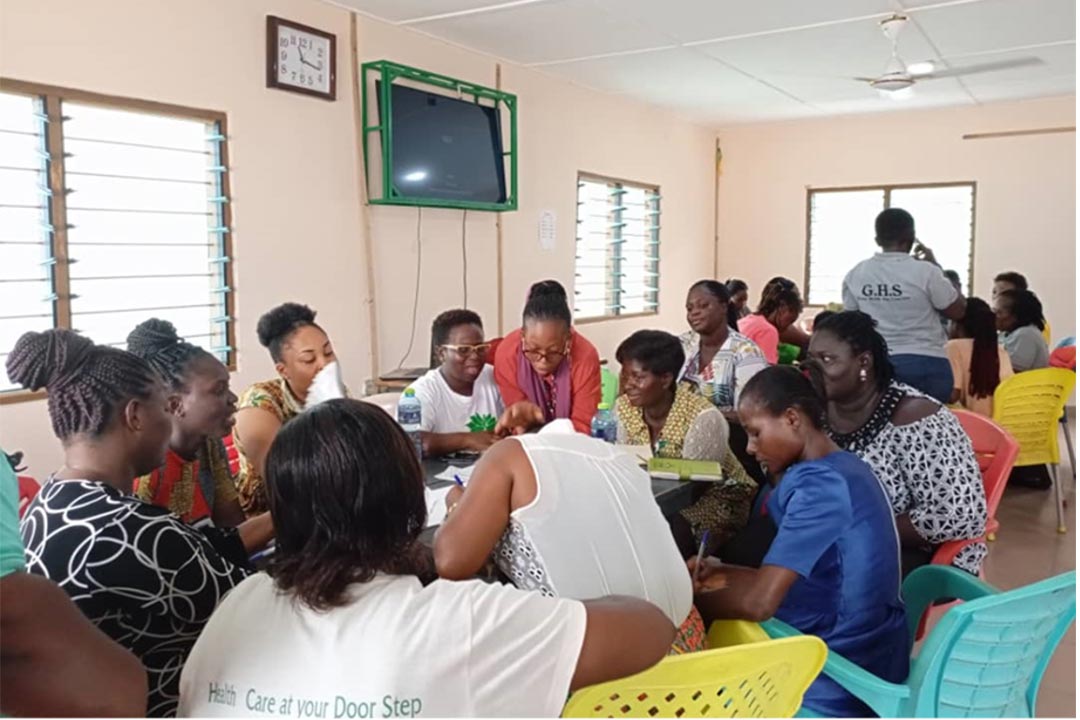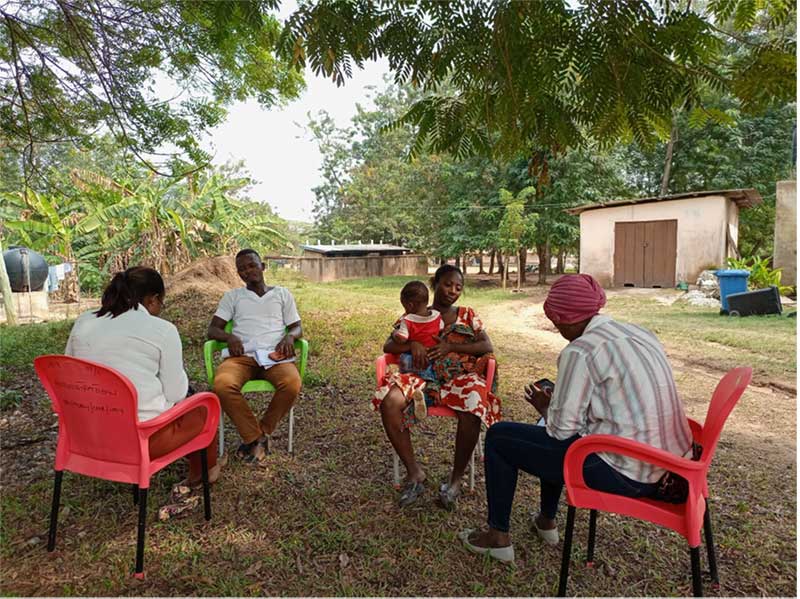Creating new norms in Ghana with human-centred design
By mid-2022 only 36% of the eligible population in Ghana had been vaccinated against COVID-19. The latest behavioural science techniques helped turn the tide.
- 18 April 2023
- 4 min read
- by Rebecca Chase

Ghana has one of the most robust child immunisation programmes in Africa and is committed to community engagement. Despite this, the community has yet to be integrated in immunisation planning. Whether for routine immunisation or COVID-19 vaccination, including community members in planning processes to understand their concerns and meet their needs is critical to the design of more effective programming.
Over the past 20 years, Ghana has made great strides in reducing mortality for children ages five and under. High coverage of childhood routine immunisations has contributed greatly to that success. Yet the onset of the COVID-19 pandemic in 2020 brought new challenges for the immunisation programme: new vaccines and cold chain requirements and an expanded vaccine-eligible population. Vaccines were developed and deployed in record time and have saved tens of thousands of lives in Ghana and millions across the globe.
"We’re learning what capacity needs to be built and how, and what it will take to sustain use of the methods."
– Lisa Oot, behavioural science team lead for JSI’s Immunisation Center
However, even by mid-year in 2022, only 36% of the eligible population in Ghana had been vaccinated against COVID-19. In response to the low rate and limited understanding of the reasons for it, JSI and Ghana Health Services, with funding from the Bill & Melinda Gates Foundation, examined the application and use of behavioural science approaches, tools, and methods, including human-centred design (HCD), for immunisation programming.
As part of the process, JSI explored integrating HCD into COVID-19 vaccination microplanning to strengthen health worker ability to design tailored social and behavioural interventions to overcome barriers to immunisation uptake, and apply and use behavioural insights for programming.

Credit: Emmanuel Nuworzah, JSI Ghana.
We held an HCD-integrated microplanning workshop with health workers and community members in Ga South, an urban district of Greater Accra. We used pre- and post-workshop questionnaires and interviews and conducted a rapid synthesis to examine health worker and community member perspectives on the facilitators, barriers, value, and effects of HCD-incorporated microplanning. We also interviewed health workers after implementing the co-designed solutions identified in the workshops.
All participants considered HCD-incorporated microplanning valuable for increasing community engagement. They noted the opportunity to identify and overcome context-specific challenges to vaccination. In follow-up interviews, health workers indicated that the community engagement resulted in plans that were more effective and higher-quality, and all interviewees reported that COVID-19 vaccination increased in their catchment areas.
Have you read?
The HCD-incorporated microplanning process gave facilities an opportunity to involve community members in planning and delivery of other health services. A health worker from Amanfro sub-district said, "Previously, we had stakeholder meetings during some of the campaigns, but decisions were taken by the health workers and later relayed to the stakeholders. In this campaign, stakeholders were involved in the decision process and proposed strategies, including selection of volunteers." Health workers and community members recommended incorporating HCD into microplanning for routine immunisation, family planning, mass drug administration, and long-lasting insecticide-treated bed net distribution.
Lisa Oot, behavioural science team lead for JSI's Immunisation Center, said, "It's incredibly exciting to see and learn how tools and approaches from behavioural science are being utilised at the district and community level to improve immunisation programming. We're learning what capacity needs to be built and how, and what it will take to sustain use of the methods."
The Ga South district have taken steps to improve vaccination coverage by using data from these activities to decide whether to continue, adapt, or abandon interventions. Ga South organised a district- level review meeting to assess progress, review implementation plans and update microplans, which will become part of a routine process.
Other districts and regions of Ghana should take note. JSI Ghana senior program specialist Emmanuel Nuwuorah said, "This is where the real needs of beneficiaries are brought to the drawing board of microplanning, with both health workers and community members strategising to act on, measure progress, and celebrate their joint efforts. It is my hope that human centred design and other behavioural science approaches will be utilised more frequently considering their immense contributions, and become the new norm in immunisation programming within Ghana."
As countries including Ghana continue to examine if and how to integrate COVID-19 vaccination into their routine immunisation systems, they will need to establish norms for identifying and reaching target populations. Approaches and methods from behavioural science can provide evidence for that work.





